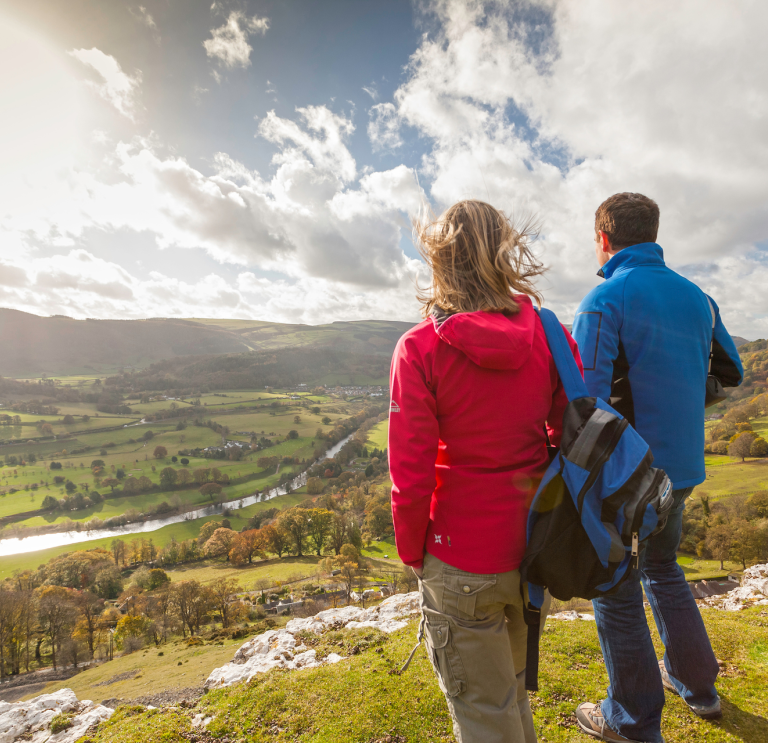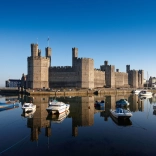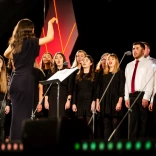Visit Wales is the national tourism marketing team for Wales. Our main aim is to encourage people to come on holiday here, because Wales is amazing! We also want to promote the country on the national and international stage.
The Welsh Government has launched its five-year plan: Welcome to Wales: Priorities for the Visitor Economy 2020-25 (pdf). It outlines how we will grow tourism and support the industry, focusing on Wales’ strengths. We want to build on our recent success and by 2025 we want to be known as a place that offers world-leading adventure, creative culture and language and outstanding, protected landscapes – and a place that wants to look after them for future generations.
To help achieve that goal, Visit Wales has a number of different channels and communities, which we use to share content and engage our followers in conversation.
It is important that our content celebrates the best of today’s Wales, complements our country’s rich history, beauty and cultural distinctiveness and creatively tells the story of the varied cast of characters that live here.
Our increasing focus is on the challenge of sustainable growth – quality over quantity; value over volume. Our content should focus on the following target markets:
New staycation markets.
Any growth in staycation holidays provides a significant opportunity for Wales to attract new, high-value visitors from across Britain to come to Wales, to stay longer and spend more in our communities. This is a highly lucrative market and the competition for UK tourists is global so our offer has got to be international in ambition and quality.
International visitors that are new to Wales.
Building Wales' international profile is a long and ongoing process; it is central to our work to build an integrated brand for Wales and to the Welsh Government’s International Strategy. We know that there are challenges when it comes to international tourism to Wales; Wales is not attracting a large enough share of international visitors to the UK. Addressing this – in a way that is sensitive to environmental issues – is crucial to our economic future.
The people of Wales.
Welsh people are important to our tourism economy too, and promoting tourism within Wales creates confidence, cohesion and opportunities at grass-roots level. The people of Wales are also the best advocates for our own country.
Visit Wales target audience
For core UK/Ireland markets our target audience is made up of Independent Explorers who:
- Value honesty and authentic experiences: They love genuine places and stories.
- Avoid tourist traps: They prefer hidden gems over crowded spots.
- Think freely: They don't follow the crowd.
- Seek enriching experiences: They look for places that challenge and inspire them.
- Engage with locals: They enjoy meeting people and diving into local culture.
- Feel accomplished: They take pride in planning and organising their trips.
- Discover the undiscovered: They love exploring places off the beaten path.
Audience identities
We focus on four unique audience identities to guide media targeting and content creation. Our main audiences include:
Cultural explorers
The cultural explorers audience is comprised of individuals seeking vibrant urban getaways. These individuals prioritise enriching and
immersive escapes. This may include engaging with a diverse range of experiences, including attending various live events such as music gigs and festivals, art galleries and other unique adventures. They also have an appreciation for trying new things, including a range of culinary offerings and desire accommodation that provides comfort to unwind after exploring the buzz of city life.
- This audience is most likely to be 25-34 or 35-44 and predominantly live with their partner and have no children.
- They want brands that are trendy/ cool, socially responsible and support local suppliers, whilst seeking those that offer personalised experiences.
- The opportunity to have cultural and once in a lifetime experiences, enjoy good food and drink while getting value for money are major travel triggers.
Best fit content:
- Theatre and live events
- Eating out
- Museums/galleries
Luxury seekers
Luxury seekers comprise an audience segment characterised by a taste for indulgence and appreciating the finer things in life. These
individuals prioritise premium experiences, seeking the best of quality, comfort, and personalised services. From lavish accommodations to fine dining, their preferences gravitate towards high-end choices. Exclusivity, attention to detail, and access to unique, high-end offerings are paramount to luxury seekers’ priorities when it comes to considering travel destinations and opportunities.
- Most likely to be 25-34 or 35-44.
- They want brands that are exclusive, make them feel valued and improve their image.
- Fair weather travellers seeking a holiday destination that will allow them to escape corporate life, switch off and completely relax in luxury.
Best fit content:
- Modern art
- Eating out / vegan food
- Cars / motoring
- Technology
- Hot tubs
Families
Families constitute a significant audience segment, defined by the need to cater for diverse preferences and priorities. This demographic places importance on accommodations and activities that account for the needs of the whole family, which likely spans across a range of age groups. Family-oriented travellers seek destinations with extensive opportunities for entertainment that will engage parents and children to make lasting memories. This group also value affordability and flexibility to align with the tight budgets and busy schedules associated with family life.
- Most likely aged 35-44 or 45-54, with one, two or three children.
- They have diverse affinity interests
- Looking for outdoor adventure activities and good activities for children/families/pets which present value for money. They are influenced by the weather and time of year.
Best fit content:
- Gardens / nature
- Eating out
- Outdoor activities
- Live events / sports
Outdoor enthusiasts
The outdoor enthusiast audience segment consists of individuals with a passion for nature and adventure. This group seeks destinations
that offer a number of outdoor activities, from hiking and camping to water sports and wildlife exploration. These enthusiasts place emphasis on the beauty of scenic landscapes and experiences that allow them to immerse themselves in nature. They prioritise accommodation that provides proximity to nature and easy access to outdoor attractions, valuing the opportunity to explore new and wild destinations.
- Most likely to be 25-34 and also young travellers aged 16-24.
- Passionate about exploring nature.
- Looking for outdoor adventure activities and natural beauty and enjoy being active, taking on a challenge and getting a sense of accomplishment.
Best fit content:
- Wildlife/nature
- Adventure/extreme sports
- Photography
Appealing to emotional triggers
We try as much as possible to get our headlines and body copy to appeal to our market segment’s emotional triggers. Each piece of content can’t possibly (or shouldn’t try to) appeal to every segment: ‘Appeal to everyone and you’ll appeal to no-one.’
When creating content it’s worth having an idea of who you’re writing for. What do they need to know? What do you want them to think, feel, and do?
The following AIDA acronym can be useful for reference.
Attention (Headline)
Interest (Capture their attention by appealing to their market segment: ‘Unmissable photo opportunities for explorers along the Welsh coast’)
Desire (Speak to their desires and triggers and highlight what’s on offer)
Action (Whenever possible, get them to commit to the next step: ordering a brochure, sharing the article, looking for accommodation by listing our accommodation or attractions databases) – all without being overtly ‘salesy’.
Visit Wales tone of voice
Visit Wales is a ‘younger site’ in the Wales Gateway portfolio – the sibling, or friend connecting with the user to recommend Wales on a personal level, providing inspiration and giving friendly advice. The Visit Wales tone of voice is therefore more informal than that of the Wales.com parent site.
Content for Visit Wales is authored either in the 'Cymru Wales voice', or in the first person by carefully selected guest writers with a passion for Wales and personal knowledge, experience or expertise to share.
Our voice is made up of many voices and we are proud of our illustrious history. We’re not living in the past, but we are proud of it. We’re always optimistic and looking forward – in Wales, people from all different walks of life make interesting things happen. We’ve got a lot to be proud of – beautiful countryside, coastline, friendly cities that people fall in love with – but we’re not boastful. We’re confident, not shouty. It’s not in our nature.
This mix of entrepreneurial, can-do spirit and quiet confidence defines our writing. It’s positive and welcoming, just like Wales.
We let our history, landscape and culture shine through in our writing. They speak for themselves. To write for Wales, think about the things that makes our country great.
Language is a powerful tool. And we have two. Our language is part of our history and future. It’s a deeply rooted part of our story and culture that makes us stand out – so be proud of it, and don’t be afraid to use it. It’s a great way of sparking curiosity, so weave in the odd word of Cymraeg into your prose, if it feels natural.
The first time a place name is written use the Welsh first and the English name afterwards in brackets, to increase the visibility of the Welsh language: e.g. Aberteifi (Cardigan). Only include the English in brackets the first time otherwise the page will be too long, and it will interrupt the flow of the piece. Where there’s only one name for a place (English or Welsh), just use the one: e.g. Cwmtydu.
Warm. Engaging. Inspiring.
Visit Wales should always be :
Warm: Everyone is welcome here. No matter who you are or where you’re from, you’re invited to enjoy Wales with us. So when we write for Wales, it’s like we’re writing to a friend. Write simply and edit ruthlessly (more on editing later). We are honest and unpretentious in our approach; unmistakably Welsh, but out to inspire, delight and ultimately convert people into visiting tourists.
Engaging: We’re excited about Wales, and we’re not afraid to show it. We’re overflowing with opportunity, and love getting people excited about everything we have to offer.
Use we, you and us, natural contractions (it’s and we’re) and the active voice (we’re building castles), not the passive (the castles are being built).
Mix up sentence length. Having longer, more contemplative sentences that build up tension and draw the reader in, alongside shorter ones makes the pace more varied. Less repetitive. More exciting.
Having said that... we don't want any overly long or complex sentences. A lot of number of people who visit the site don't have English as a first language, so any overly descriptive narrative (or too many puns!) will be lost on them. Try and keep your writing straightforward where you can, and avoid using too many clauses within the same sentence. If you can split the sentence, usually it's a good idea to do so. A good rule on this: If in doubt, keep it simple!
Stand out to the online scanners. Break up text with eye-catching quotes and extracts, feature the essence of the article in these (with SEO value in mind, too). Your headlines and quotes can also boost searchability. Help us help Google by using the names of products and places in your titles and descriptions.
Enjoy telling stories – we have so many of them – our myths, our legends, our prospects.
Read your writing out loud. Do you want to keep listening? Keep it scannable for the mobile browsers (around 70 per cent of our monthly sessions) by offering pithy, short sentences with high-quality visuals.
Ask questions (Where do you want to go? What should we do next?) – start conversations with your content and create compelling and emotional connections.
Inspiring: We’re smart, but not boastful. Confident, not arrogant. Our confidence inspires others. It’s understated, elegant, trusted.
Show what you know. Draw on your knowledge and experience as you write. When’s the best time to visit Eryri (Snowdonia)? What can you do there? What’s unique about Eryri – things that you can’t do in Cornwall or the Peak District?
Facts over fiction. If you make any claim, back it up. If we say we have the world’s oldest castles – make sure we do.
Keep your writing precise, specific and evocative.
Use adjectives like alive, distinctive, adventurous, pioneering, more than nice or good. But don’t over promise or be hyperbolic – people stop believing you. We want your writing to feel authentic and original.
Avoid the clichés!
Sometimes they creep in but please try to avoid using any of the following tourism clichés!
- Picturesque / charming / quaint
- Friendly locals
- Hidden gems
- Off the beaten track
- Stepping back in time
- Land of contrasts
- Whatever you’re looking for you will find it in …
- Something for everyone
- From the … to the …
- It’s the best-kept secret
- And it doesn’t end there
- It’s not called the land of … for nothing
- Coastal splendour
- It’s a mixture of old and new / traditional and modern
- An experience not to be missed
- And if that’s not enough …
- Inspirational scenery
- You will not be disappointed
- Fun for all the family
- You will never be bored
- A unique blend
- The great outdoors
- Got a zest for life? You will find XXX here
- Live life at a slower pace
- Transport yourself to another time
- Another world is waiting
- In the lap of luxury
- Looking for XXX? Why not try XXX?
- X has got it all…
- The (San Tropez/Little Italy/Hollywood) of (Wales/North Wales/Aberystwyth)
Tone and style checklist
If you have to remember just five things about how to write for Wales, make it these:
- Show what you know about Wales. Our history, our industry, our opportunity.
- Write simply and warmly. We’re confident enough to cut the hyperbole and fluff and let our personality shine through.
- Read your writing out loud. If it doesn’t sound right, get that red pen out and try again.
- Show what you love about Wales. What makes it great? Then back it up.
- When writing in English, don’t be shy of weaving in a little Cymraeg, if it’s appropriate. It’s a great way of standing out in a busy world, and can really add to a story.
- Finally ... KISS (keep it short and simple)
Keep it short. With an increasing number of users primarily accessing our content on mobile devices, it's important to consider scroll depth. Content longer than 600-800 words plus images, creates a long page and demands a longer attention span than users have, or are prepared to give while browsing on mobile devices.
Keep it simple. Half the UK has a reading age of 11-years-old or younger – and don’t forget, a lot of our English language content will be read by people internationally, and their first language might not be English. The simpler your text, the better (this means an average sentence length of around 12 words, but of course, you should mix this up a bit). Please try not to include too many complex clauses or super-long words.



